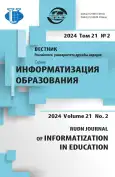Developing the digital research competence of a future mathematics teacher as a part of project activities
- Autores: Alekseeva E.N.1
-
Afiliações:
- Oryol State University named after. I.S. Turgenev
- Edição: Volume 21, Nº 2 (2024)
- Páginas: 147-156
- Seção: ICT SKILLS AND COMPETENCIES AMONG TEACHERS
- URL: https://journal-vniispk.ru/2312-8631/article/view/321363
- DOI: https://doi.org/10.22363/2312-8631-2024-21-2-147-156
- EDN: https://elibrary.ru/GRTUBI
- ID: 321363
Citar
Texto integral
Resumo
Formulation of the problem. The formation of a digital educational environment as early as at the school level is a necessary condition for successful solution of the problem of training personnel for the digital economy, a priority direction of the “Digital Educational Environment” project within the framework of the national project “Education”. The use of specialized software products in teaching mathematics plays an important role in the intellectual development of students, including schoolchildren who have a high level of mathematical abilities and require an individualized approach to learning. More than ever before, the problem of developing appropriate professional competence among students and future mathematics teachers is becoming more relevant for universities that specialize in training teachers. The objectives of the study are to analyze the experience of developing special digital research competence in students as part of their implementation of project assignments using digital technologies and to formulate proposals for improving the process of future mathematics teachers mastering digital tools for teaching geometry at the stage of their higher education. Methodology: аn analysis of the possibilities of using the GeoGebra dynamic geometry system in mathematical practice-oriented project studies of students and future mathematics teachers was carried out. During the implementation of design tasks, methods of experimental mathematics and visualization of geometric objects were used. Results. The possibilities of using specialized dynamic geometry systems for organizing the design and research activities of students have been studied. An end-to-end subject-based methodological line has been designed and tested for future mathematics teachers to acquire competencies in the development and use of digital educational resources for teaching geometry and to get skills for organizing project activities for students having the high level of mathematical abilities. Individualized approaches to teaching students, future mathematics teachers, are proposed in the context of developing their readiness for professional activities in the conditions of development of individualization of school education. Conclusion: the practical experience of digital tools usage by students in practice-oriented project research, the implementation of which led to interesting results with elements of novelty, is presented.
Palavras-chave
Sobre autores
Elena Alekseeva
Oryol State University named after. I.S. Turgenev
Autor responsável pela correspondência
Email: alexeeva_e_n@mail.ru
ORCID ID: 0009-0004-8294-4079
Candidate of Physical and Mathematical Sciences, Associate Professor, Vice-Rector for Academic Affairs, Associate Professor of the Department of Mathematical Analysis and Methods of Teaching Mathematics
95 Komsomolskaya St, Orel, 302026, Russian FederationBibliografia
- Bezumova OL. Teaching geometry using GeoGebra capabilities. Arkhangelsk: KIRA Publ.; 2011. (In Russ.)
- Tankevich LM, Shklyar AE. GeoGebra as the tool for solving stereometric problems. Young Scientist. 2018;(11):53‒57. (In Russ.)
- Dalinger VA. Digital educational resources in the service of geometry teaching methods in school. Information and Education: Boundaries of Communications INFO. 2020;(12): 47–50. (In Russ.)
- Antsiferova AV, Mayer VR. “Living geometry” as a means of developing students’ research skills in the conditions of individual-oriented learning. Vestnik KSPU im. V.P. Astafieva. 2010;(2):9–15. (In Russ.)
- Bychkova DD. Formation of professional competencies among future subject teachers in the field of creating digital educational resources. Computer Science and Education. 2021;(3):23‒30. (In Russ.) https://doi.org/10.32517/0234-0453-2021-36-3-23-30
- Weindorf-Sysoeva ME, Subocheva ML. Model of multi-level training of teaching staff for professional activities in the conditions of digital learning. Homo Cyberus. 2019;(2):44–55. (In Russ.)
- Grebenyuk TB. Preparing a future teacher for the digitalization of education as a pedagogical problem. Kaliningrad Bulletin of Education. 2020;(2):20–27. (In Russ.)
- Grossman P, Dean CGP, Kavanagh SS, Herrmann Z. Preparing teachers for project-based teaching. Phi Delta Kappan. 2019;100(7):43–48. https://doi.org/10.1177%2F0031721719841338
- Rahmania I. Project based learning (PjBL) learning model with STEM approach in natural science learning for the 21st century. Budapest International Research and Critics University Journal. 2021;4(1):1161‒1167.
- Safuanov IS, Galyamova EKh. The influence of modern information technologies on methods, forms and means of implementation of methodological training for future teacher of mathematics. Bulletin of the Moscow City University. Series: Informatics and Informatization of Edication. 2011;(2):86‒90. (In Russ.)
- Shashkina MB. Peculiarities of the information technologies’ use in the preparation of a future mathematics teacher at the present stage. Vestnik KSPU im. V.P. Astafieva. 2013;(1):228–231. (In Russ.)
- Bogdanova EA, Bogdanov PS, Bogdanov SN. Implementation of research work of future mathematics teachers with the use of GeoGebra system of dynamic mathematics. RUDN Journal of Informatization in Education. 2023;20(2):207–220. (In Russ.) http://doi.org/10.22363/2312-8631-2023-20-2-207-220
- Alekseeva EN. Principles of methodological preparation of a future mathematics teacher for working in conditions of individualization of education. Bulletin of the Leningrad State University named after A.S. Pushkin. 2022;(4):162‒179. (In Russ.) http://doi.org/10.18384/2310-7219-2022-4-87-99
- Gorshkov SB. Centers of gravity and geometry. Moscow: MTsNMO Publ.; 2015. (In Russ.)
- Alekseeva EN, Savateeva ES. Using the GeoGebra program in teaching solving Olympiad problems in geometry for future mathematics teachers. Digital Tools in Education: Collection of Articles Based on the Materials of the All-Russian Scientific and Practical Conference with International Participation, April 6–7, 2023. Surgut: Surgut State Pedagogical University; 2023. p. 93–97. (In Russ.)
Arquivos suplementares









